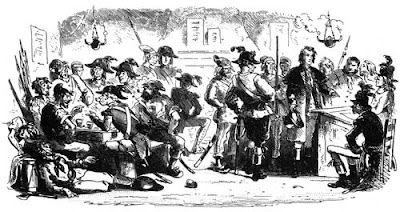The dawn of a new liberal administration affords those of us on the right a good opportunity to regroup as we contemplate our next step. To be sure, January 20, 2009 is not a particularly festive day for those who value the immortal words enshrined in the Declaration of Independence, in particular, those that speak of certain “self-evident truths” about the “right to life.” I woke up contemplating the near-universal jubilation sweeping the nation and tried to squared that with the stubborn
weltschmerz I experienced, so I asked myself, “Am I simply being a sore loser, a grump? Perhaps I should shelve my discontent and the politics for just the day and take in the magnitude of what’s happening.” But the more I thought about it, I arrived at the certainty, the moral conviction, that
it is precisely because I am aware of the magnitude of what is happening that I can’t shelve my thoughts, my emotions, even for just one day, to join in the jamboree.
I can engage in lively debate about issues like war and peace, the economy, health care, just wage and education. Heated back and forth rages even within the conservative milieu about the particulars of the aforementioned issues. But there is one issue about which there is nearly total agreement on the conservative side and that is abortion. For conservatives, the unborn child, from the moment of conception is a person. That assertion does not require a venture into the “above my pay grade” realm; it is something we know with certitude. Even if the unborn child has not yet acquired the full physical or psychological capabilities of a child or an adult, he nevertheless
instantiates those potentialities by his very existence. Personhood is not limited in any sense by an imperfect or incomplete degree of reason and self-awareness within a particular person. So, as I see it, the intentional act of terminating the life of a person
via procured abortion is rightly considered a grave moral evil.
Often, the primacy given by conservatives to the goal of ending legalized abortion is described unflatteringly by proponents of abortion and those on the fence as “single-issue voting.” The aim is to depict pro-life voters as narrow, small-minded ideologues who fail to give significant attention to the other important issues of the day, like those mentioned earlier. Abortion, we are condescendingly lectured, is only one of many issues “out there” and we must learn to balance them accordingly on the scale of the practical. It’s deeply impractical and somewhat odd to focus so narrowly on abortion.
“Get over it.” Unfortunately, many Catholics also ascribe to this specious “seamless garment” theory, which states, more or less, that all moral issues carry equal weight in the social setting and that in some scenarios it may be perfectly legitimate, even courageous, to pull the lever for a candidate who supports abortion if he is committed to ending poverty, or this or that social ill. And so on.
To help bring the issue out of the clouds and back down to earth, I like to use the hypothetical example of candidate X who supports the reintroduction of slavery in the United States but on every other issue, he is right on the money. Would any rational voter say to himself, “Well, his views on slavery don’t jibe with mine but he’s got a great healthcare plan and he’s so eloquent. I’m onboard!” I don’t think so. Most sane voters, I’m fairly confident, would emerge as “single-issue voters” in this case, judging the approbation of slavery as a position meriting instant disqualification for serious consideration and voters would rightly make sure that candidate X never made it through the first round of voting in the primaries. I doubt, with such an example, that many folks across the fruited plain would lambaste the average American voter for his narrow adherence to the principle of single-issue voting.
With that in mind, my unwillingness, along with many others, to join in today’s festive
mise en scène surrounding the Obama inauguration will hopefully seem more understandable. For we view the approbation of abortion as a “right” as utterly heinous, incomprehensible and thoroughly contrary to the most basic laws of nature. President Obama’s long record of support for the so-called “right to abortion” disqualified him long ago as a serious contender for our vote. Opposing his candidacy was a moral obligation for the convicted pro-life voter. Much like the issue of slavery, there is no middle road, no third way, on the subject of abortion. How, in good conscience, could I celebrate the elevation of a man whose principles clash so mightily with mine on the basic question of the right to life of the most defenseless among us, the unborn?
Pro-lifers have their work cut out for them. For whatever reason, many of our fellow citizens and, even more vexing, many fellow Catholics, don’t seem to care about the gravity of abortion and its implications. We need to boldly rethink our strategy and methods, our grammar and vocabulary for addressing this issue in the years ahead because, apparently, what we’re used to doing is not working all too well in the age of Obama. He has considerable talents for employing rhetoric and subtle nuances to massage and direct the dialogue wherever he wants to take it, all along defining the terms of the argument and placing the opposition on the defense. We should study this carefully so as to retake the PR advantage. Millions of unborn are counting on us.



















